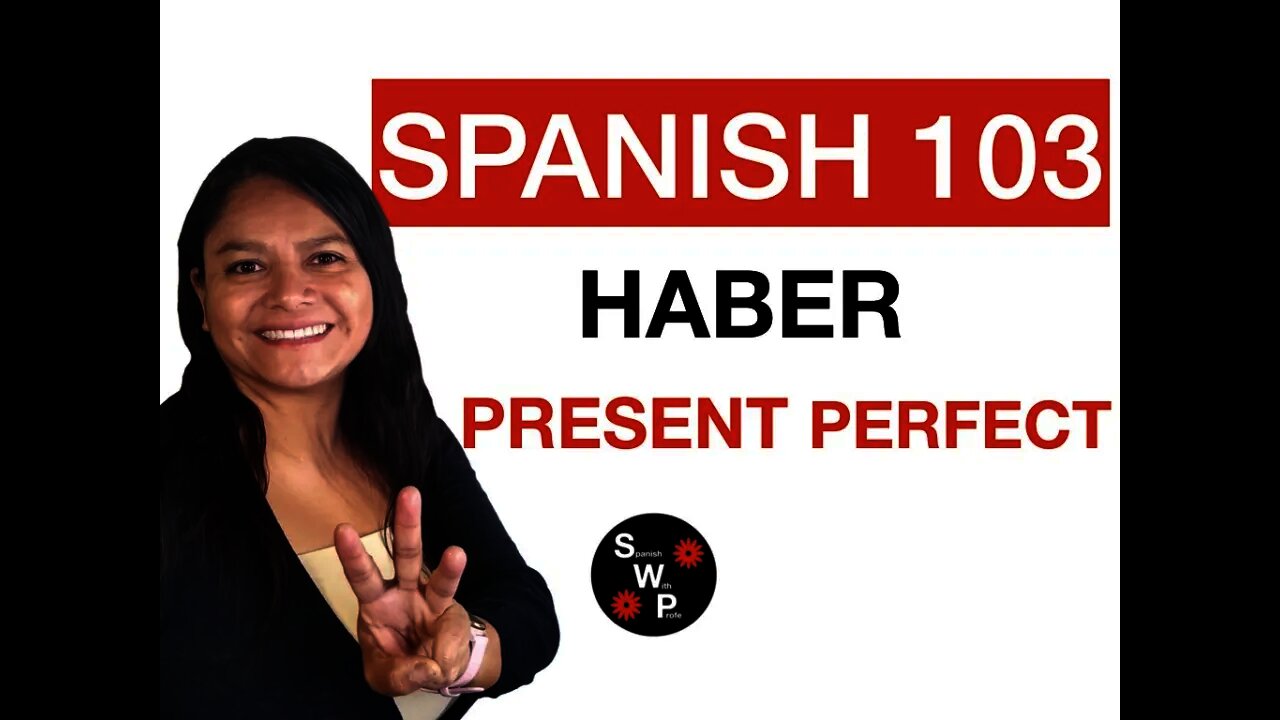Premium Only Content

Spanish 103 - How to Form Haber in the Present Perfect in Spanish for Beginners Spanish With Profe
In this video you will learn the Present Perfect. In Spanish to form the present perfect you will need the helping verb Haber, this is one of the few times where you will see Haber conjugated for each subject pronoun(yo, tú, él, ella, usted, nosotros/as, ellos, ellas, ustedes).
In English you form the present perfect by using "to have" as a helping verb. I have eaten. You have traveled. He has gone. We have danced too much. They have loved each other for so long. In Spanish we use the verb "Haber" to form the Perfect tenses and not "Tener" which would be the English equivalent. Do not put anything in between Haber and the past participle. To construct a negative statement; be sure to put "No" first, then the pronoun (reflexive, direct, indirect) and lastly comes the helping verb Haber. Yo no he escrito la carta todavía. (I have not written the letter yet.)
The following are the Haber conjugations to be used with the Present Perfect
yo he*
tú has
él, ella, usted ha
nosotros/as hemos*
ellos, ellas, ustedes han
*Notice that the first person singular Yo (HE) and the first person plural Nosotros (HEMOS) have an "e" instead of an "a" like the other verbs.
There are no stem changing verbs in the past participle only regular and irregular verbs.
the past participle of regular verbs is formed as followed
-ar= ado
-er/-ir= ido
Since they are verbs, they don't have gender or number. So make sure you have "o" every time you use the past participle with Haber to form the present perfect
In the present perfect the verb "haber" is the only thing that changes but the past participle stays the same, meaning "o" and nothing else. Remember verbs do not have a gender but adjectives do.
Yo he comido una hamburguesa.
Tú has comido una ensalada.
Ella ha comido un pastel.
Nosotros hemos comido pasta.
Ellos han comido pollo.
Below you will find a list of irregular verbs and their corresponding past participle.
Remember they are verbs so they will remain the same all through out, meaning the "o" is always going to be "o" regardless of the pronoun (yo, tú, él, ella, usted, nosotros/as, ellos, ellas ustedes) that is used.
The examples listed below of irregular verbs have one sample pronoun sentence to illustrate that the verb's conjugation in the past participle never changes.
abrir=abierto (yo he abierto)
decir=dicho (tú has dicho)
descubrir=descubierto (él ha descubierto)
describir=descrito (ella ha descrito)
escribir=escrito (usted ha escrito)
hacer=hecho (nosotros hemos hecho)
morir=muerto (nosotras hemos muerto)
poner=puesto (ellos han puesto)
resolver=resuelto (ellas han resuelto)
romper=roto (ustedes han roto)
ver=visto
volver=vuelto
The following verbs carry a written accent on the í when dropping the -er/-ir add a tilde over
the í for :
caer=caído
creer=creído
leer=leído
oír=oído
reír=reído
sonreír=sonreído
traer=traído
Yo he comido cinco hamburguesas en un día.
(I have eaten five hamburgers in one day.)
Tú has ido al cine con tus amigos.
(You went to the movies with your friends.)
Nosotros hemos escrito la carta.
(We have written the letter.)
Yo no he desayunado hoy.
(I have not had breakfast today.)
Tú te has despertado muy tarde hoy.
(You woke up very late today.)
Some Ways Below To Help Out The Channel Listed Below
► DONATIONS via PayPal (To help support the channel you can donate via PayPal): https://paypal.me/SpanishWithProfe?locale.x=en_US
► ROBINHOOD (Get 1 Stock When You Sign Up. Easy to use app for investing and you get a free stock.): https://join.robinhood.com/grants1730
► WEBULL (Get 2 Stock When You Sign Up):https://www.webull.com/activity/get-free-stocks?inviteCode=uYiu2aNdG46N&source=invite_gw&inviteSource=wb_oversea
► CRYPTO.COM Use my referral link https://crypto.com/app/e3p3g4rc9m to sign up for Crypto.com and we both get $25 USD :)
-
 0:42
0:42
Spanish With Profe
1 year agoLearn how to say #flood in Spanish #inundación
199 -
 LIVE
LIVE
Due Dissidence
11 hours agoTrump Calls To "CLEAN OUT" Gaza, Swiss ARREST Pro-Palestine Journalist, MAGA's Hollywood Makeover?
3,124 watching -
 2:02:20
2:02:20
Nerdrotic
3 hours ago $7.89 earnedDECLASSIFIED: JFK, MLK UFO Immaculate Constellation Doc | Forbidden Frontier #089
53.4K2 -
 3:00:14
3:00:14
vivafrei
11 hours agoEp. 248: "Bitcoin Jesus" Begs Trump! Rekieta Gets Plea Deal! Pardons, Deportations, Bird Flu & MORE!
104K77 -
 3:44:06
3:44:06
Rising Rhino
10 hours ago $10.97 earnedWashington Commanders Vs Philadelphia Eagles: NFL NFC Championship LIVE Watch Party
46.2K3 -
 13:00
13:00
Exploring With Nug
4 hours ago $2.53 earnedHe Went To Get A Haircut And Vanished WIthout a Trace!
34.3K -
 18:53
18:53
DeVory Darkins
1 day ago $24.07 earnedTrump JUST ENDED Mayor Karen Bass During HEATED Meeting
70.3K207 -
 21:06
21:06
Russell Brand
8 hours agoIT'S COMING
125K338 -
 21:26
21:26
Stephen Gardner
1 day ago🔥What JUST leaked out of Congress must be STOPPED NOW!
127K274 -
 53:25
53:25
tether
11 days agoStability and Freedom in Chaos: The Story of Tether USD₮ | Tether Documentary (USDT)
140K5